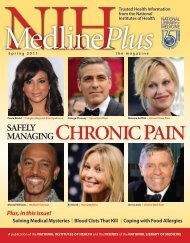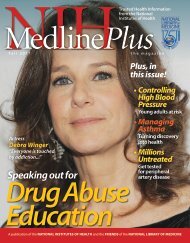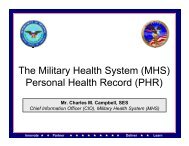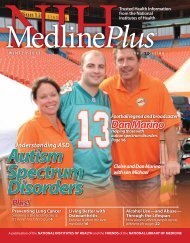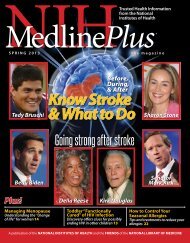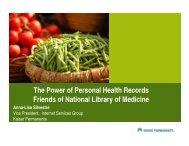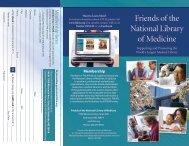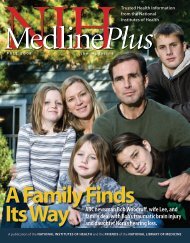Sam Donaldson's cancer survival tips - National Library of Medicine ...
Sam Donaldson's cancer survival tips - National Library of Medicine ...
Sam Donaldson's cancer survival tips - National Library of Medicine ...
You also want an ePaper? Increase the reach of your titles
YUMPU automatically turns print PDFs into web optimized ePapers that Google loves.
NIH Study Seeks to Relieve Fibroid Pain with Fewer Side Effects<br />
Researchers at the <strong>National</strong> Institutes <strong>of</strong> Health’s<br />
<strong>National</strong> Institute <strong>of</strong> Child Health and Human<br />
Development (NICHD) are evaluating a new treatment<br />
for women suffering from uterine fibroids: an<br />
experimental drug that blocks progesterone, a female<br />
sex hormone secreted by the ovaries. Because fibroids grow<br />
in response to progesterone, therapies that lower progesterone<br />
levels could cause fibroids to<br />
shrink. That could help relieve pain<br />
and other symptoms and possibly<br />
improve fertility in women with<br />
fibroids.<br />
Currently there is only one effective<br />
hormone-reducing therapy<br />
available for relieving fibroid symptoms,<br />
but it has serious side effects.<br />
It works by blocking the master reproductive<br />
hormone, gonadotropin<br />
releasing hormone (GnRH). Blocking<br />
GnRH not only shuts down the<br />
body’s production <strong>of</strong> progesterone.<br />
It also shuts down production <strong>of</strong><br />
estrogen, another sex hormone.<br />
Since abruptly depriving the body<br />
<strong>of</strong> estrogen causes hot flashes and<br />
prolonged estrogen deprivation can<br />
weaken bones, this treatment can<br />
only be used short-term.<br />
The NIH researchers hope to<br />
Brigham and Women’s Hospital<br />
Got Fibroids?<br />
Volunteers Wanted: Sisters Who<br />
Have (Or Have Had) Fibroids<br />
The Center for Uterine Fibroids at Brigham and Women’s<br />
Hospital is seeking participants for a study to identify the<br />
causes <strong>of</strong> uterine fibroid tumors. We are looking for families<br />
in which two sisters have (or have had) uterine fibroids. The<br />
study involves filling out two surveys and giving a blood<br />
sample, all <strong>of</strong> which can be done by mail at no cost to you.<br />
For more information, call the Center at 1-800-722-5520<br />
(ask operator for 525-4434), e-mail us at fibroids@rics.<br />
bwh.harvard.edu, or visit our Web site: www.fibroids.net.<br />
You may also write to us at Center for Uterine Fibroids, 77<br />
Avenue Louis Pasteur, NRB 160, Boston, MA 02115.<br />
develop a therapy that would block progesterone while leaving<br />
estrogen alone. In theory, such a treatment could shrink<br />
fibroids but spare women from hot flashes and bone weakening.<br />
Lynnette Nieman and her NIH coworkers are seeking<br />
volunteers for their study <strong>of</strong> the drug, called CDB-2914, which<br />
prevents progesterone from acting in the tissues but which<br />
does not interfere with estrogen action. The study will evaluate<br />
whether this drug causes fibroids to shrink in pre-menopausal<br />
women. Prospective volunteers must<br />
• Be between 33 and 50 years old<br />
• Have regular menstrual cycles<br />
• Have a history <strong>of</strong> uterine fibroids that cause heavy bleeding,<br />
pressure, or pain.<br />
After some preliminary medical tests, volunteers will receive<br />
either CDB-2914 or a placebo (an inactive compound) for<br />
three menstrual cycles. (Which option a woman receives<br />
is randomly assigned.) At the end <strong>of</strong> the treatment period,<br />
volunteers can choose one <strong>of</strong> several options: to receive a<br />
hysterectomy (surgery to remove the uterus) or a myomectomy<br />
(surgery where fibroids are removed but the uterus stays<br />
intact), or to receive three months <strong>of</strong> CDB-2914, regardless <strong>of</strong><br />
whether or not they received it during the study. They can also<br />
choose to exit the study completely at that time.<br />
To find out more about the study, call the NIH Patient<br />
Recruitment and Public Liaison Office at 1-800-411-1222.<br />
The e-mail address is prpl@mail.cc.nih.gov. Information<br />
about the study is also available from http://fibroids.nichd.<br />
nih.gov/criteria.html.<br />
and given a blood sample to be a part <strong>of</strong> this “sister study.” Dr.<br />
Morton and her colleagues are hoping that others will volunteer, as<br />
well, so that their study can help end the needless pain and suffering<br />
that many times goes along with the tumors. They also hope to<br />
find ways to reduce the symptoms <strong>of</strong> fibroid tumors that are less<br />
invasive than hysterectomy.<br />
“My advice to other women with uterine fibroids,” says Susan,<br />
who took part in the sister study, “is to listen to your body and keep a<br />
record <strong>of</strong> your family history. Treat the symptoms, but more importantly,<br />
treat the cause. Explore all <strong>of</strong> your options.”<br />
“We have to spread the word about fibroid tumors,” says Dr.<br />
Morton. “By participating in this study, which is free and can be<br />
done by mail, women can help speed up research that will help<br />
future generations <strong>of</strong> women avoid the problems associated with<br />
these tumors.” n<br />
www.medlineplus.gov Spring 2007 21



